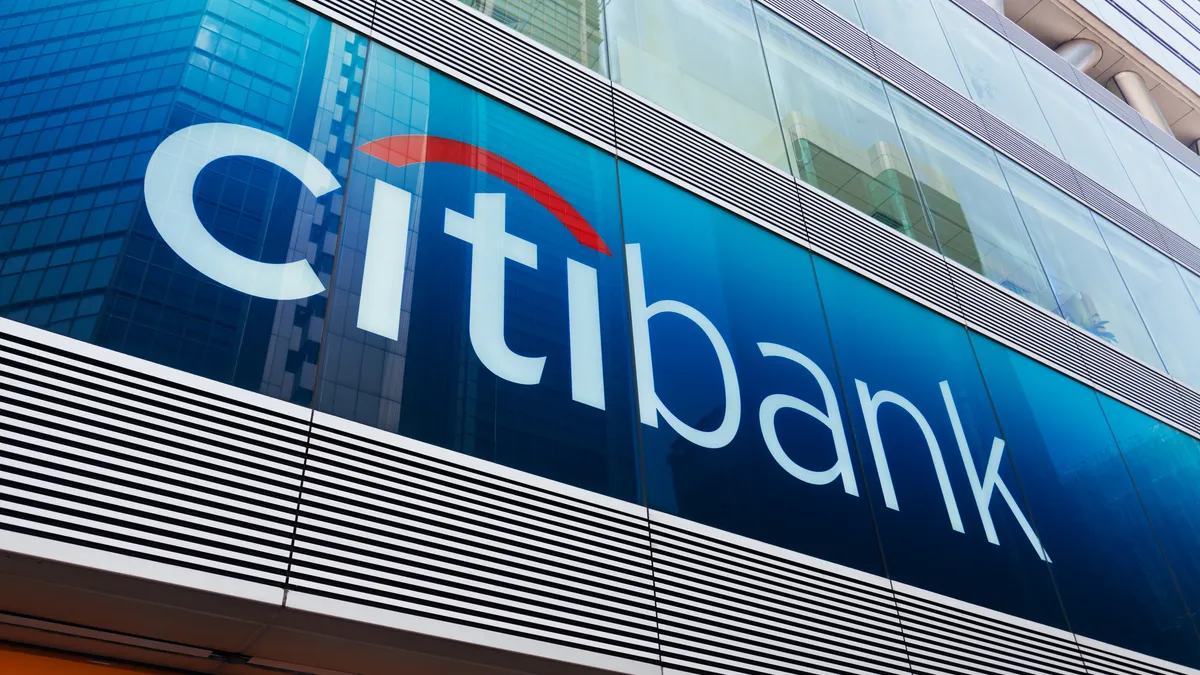Dive Brief:
- Citi promoted 70 women among the 241 people it named managing director this year, according to an internal memo this month seen by Bloomberg.
- That represents 29% of this year's group — a slight uptick from 28% in 2019, the company said. This year's class included five Black managing directors, up from three last year.
- Citi earned praise for becoming the first major U.S.-based bank to report raw gender pay gap data. Since then, it has taken a position as a thought leader in gender inclusion and, in February, will become the first big U.S bank to promote a woman to CEO.
Dive Insight:
The promotion data reported Monday drives home the point that change is slow. Citi in January 2019 reported women, on average, make 29% less than men — a figure the bank was able to narrow to 27% in 2020.
Citi further established its goal as a thought leader on the matter when it released, in October 2019, a two-minute video capturing the reaction of young girls when they first learn of the pay gap. The campaign aimed to bring awareness to data predicting the gap would not close until 2227.
The bank in 2018 said it sought for women to comprise at least 40% of its assistant vice president through managing director levels companywide by the end of 2021.
"Radical transparency certainly makes you uncomfortable, but it's important to get out of the old habits," incoming CEO Jane Fraser said in Citi's most recent diversity report, according to Bloomberg. "You've got to shake your thinking up and do something differently, and that's why it makes a difference."
Citi is not the only big U.S. bank to put hard targets on its representation goals. Goldman Sachs in August laid out its intention for women to make up 40% of its vice presidents by 2025. Among 60 new partners the investment bank named last month, 27% are women — up from 26% in 2018. The bank in September named 43-year-old Stephanie Cohen co-head of its consumer and wealth management business. She is the first woman to lead a Goldman division since trading co-chief Isabelle Ealet left the bank in 2018.
Citi this year named several women to leading roles this year, including Pam Habner atop the bank's U.S. branded card unit; Titi Cole to lead operations and fraud prevention at Citi's consumer bank; and Jennifer Taylor to oversee compliance in the bank's institutional business.
The bank promoted Fraser to president, Citi's No. 2 role, in October 2019, putting her in line to become CEO. The succession timeline hastened in September amid reports that the Office of the Comptroller of the Currency and the Federal Reserve were considering reprimanding the bank over deficiencies in its risk management framework.
"This will be a multiyear effort, and I believe it is best for the firm for my successor to lead this important work from the beginning," outgoing CEO Michael Corbat wrote in a September memo announcing his retirement, according to American Banker.
A bank spokesperson, however, told Bloomberg "it was always Mike's plan to retire in 2021." He simply hadn't discussed a specific timeline with Fraser or the bank's board, sources told The Wall Street Journal.
Despite the incremental process Citi has made on the gender front, racial diversity has taken more of the spotlight since the May killing of George Floyd by police sparked a spate of investments and renewed commitments to inclusion.
Wells Fargo in June said it wanted to double the number of Black leaders at the bank within the next five years. HSBC, Goldman Sachs, Visa and Mastercard echoed their own pledges. Citi said in 2019 it wanted to boost to 8% by 2021 the proportion of Black people among its assistant vice presidents and managing directors.
Progress hasn't always been smooth. Wells CEO Charlie Scharf came under fire for his assertion that his bank faces a "very limited pool" of qualified Black talent to fill senior roles. Morgan Stanley in June was sued by its former diversity chief, who claimed the bank made little effort to retain Black talent. And a 10-year-old lawsuit — claiming Goldman Sachs denied women equal pay and promotions, and made biased decisions regarding compensation — continues to dog that bank.














